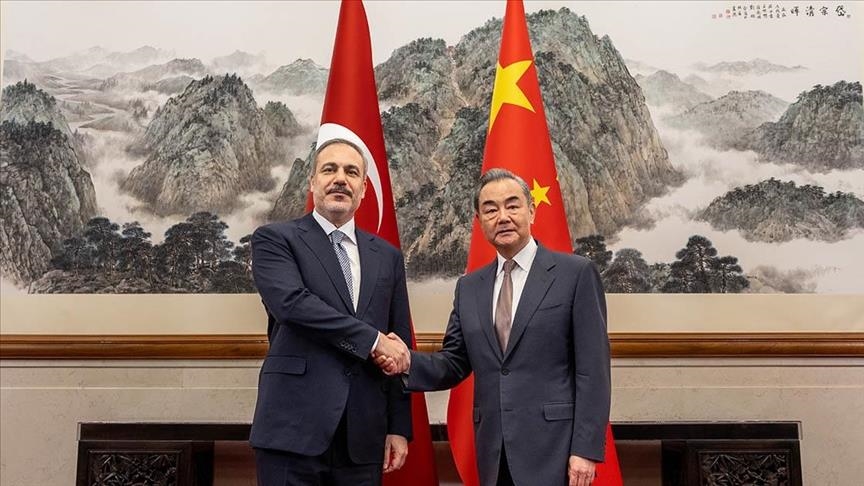OPINION - Decoding Hakan Fidan's China visit: Economic cooperation and multipolarity
Turkish Foreign Minister Hakan Fidan's recent visit to China holds considerable significance, not only from a diplomatic standpoint but also for the strategic messages it conveys

- The author is a researcher at TRT World Research Center
- In era of transitioning towards multipolarity, where China's ascent coincides with the gradual decline of the West, the question of how Türkiye will position itself strategically becomes paramount
- Türkiye, with its desire to develop significant areas of cooperation economically while boosting its middle power status derived from its geopolitical significance, will continue its partnership with China to maximize its national interests
ISTANBUL
Turkish Foreign Minister Hakan Fidan's recent visit to China holds considerable significance, not only from a diplomatic standpoint but also for the strategic messages it conveys. This visit is timely, taking place as the fractures in the global order become more pronounced and new alliances are formed.
Fidan's speech in Beijing, titled "Türkiye-China Relations in the Changing World Order," provides clear pointers to the future trajectory of bilateral ties and the global order. Two key themes underpin this visit: enhancing cooperation and gearing up toward a multipolar international system.
Turkish Foreign Minister Hakan Fidan's recent visit to China is significant both diplomatically and strategically, especially as global fractures deepen and new alliances form
— Anadolu English (@anadoluagency) June 7, 2024
Decoding Hakan Fidan's China visit: Economic cooperation and multipolarity https://t.co/JWybRlDZjP pic.twitter.com/aBvnUtHTcW
Critical aspects of Fidan's China visit
The primary focus of Fidan's three-day official visit [1] is on enhancing economic cooperation between Türkiye and China, which includes areas such as balancing the trade deficit (currently in favor of China) by lifting import restrictions on agricultural products, promoting tourism, and addressing sectors like aviation. Türkiye's expectations regarding Chinese investment, particularly in high-tech and research-development (R&D) fields, were also underscored.
The Organization of Turkic States (OTS) was highlighted as a significant opportunity for both bilateral and multilateral cooperation. This is particularly noteworthy as Central Asia is a core trade corridor that China has established to access Western markets. Türkiye has also strategic interests in Central Asia and seeks to have more positions in these trade networks. Türkiye's strategic position as a transit hub for connecting Europe, the Middle East, and Africa is important for China's quest to increase its market access.
Additionally, both nations underscored their mutual approach to counterterrorism and respect for territorial integrity. Fidan's commendation of China's sensitive stance on the ongoing Israel war on Gaza was notable. Furthermore, Fidan's expression of Türkiye's interest in joining BRICS signals even more eagerness from the Turkish side to expand multifaceted cooperation.
Another critical aspect of Fidan's visit is Türkiye's quest to prepare its posture amidst the shifting international power balance. As the first quarter of the 21st century ends, China emerges as a global power to be reckoned with. Since the 1980s, Western forces depicted China as a partner. However, this is no longer the case. Beijing is portrayed as a strategic competitor. While China is increasingly painted as a threat by the US-led Western order, as exemplified by Western media narratives, think tank analyses, and political discourse, any decoupling from China from global supply chains would be extremely detrimental to the global economy.
China is omnipresent in international commerce with a significant footprint worldwide via leading initiatives like BRICS and the G-77 and by investing globally through its multi-billion-dollar Belt and Road Initiative (BRI).
How will Türkiye position itself in the era of transitioning toward multipolarity?
The US, whose post-Cold War unipolar dominance is eroding, finds it increasingly difficult to impose its order, especially amidst Israel's onslaught on Gaza.
In this era of transitioning toward multipolarity, where China's ascent coincides with the gradual decline of the West, the question of how Türkiye will position itself strategically becomes paramount. As global dynamics shift, Türkiye is developing regional connectivity [2] networks that reinforce its geopolitical position as an essential player.
Despite not being part of Washington's India-Middle East-Europe Economic Corridor (IMEC), which is positioned against the BRI, Türkiye has initiated the Development Road Project, [3] launched cross-border operations to combat terrorism, and found partners like Qatar and the United Arab Emirates (UAE) for this interconnectivity initiative.
Türkiye's strategy offers insights into how middle powers can navigate within the emerging multipolar world shaped by China's rise. Today, the clear-cut bloc divisions of the Cold War era have given way to a more fluid world where middle powers engage with various sides on different issues. For instance, Gulf countries maintain security and arms trade relations with the US while developing economic partnerships with China and joining blocs like BRICS. Saudi Arabia, a traditional US ally, is poised to join BRICS alongside its arch-nemesis Iran. Thanks to Chinese mediation, Riyadh undertook normalization steps with Iran even if it still sources 80% of its arms imports [4] from Washington. Similarly, India maintains strategic cooperation and major defense partnerships with the US while participating in trade route initiatives like International North–South Transport Corridor (INSTC), which includes Russia and Iran.
In this multipolar and multi-alliance era, Türkiye, with its desire to develop significant areas of cooperation economically while boosting its middle power status derived from its geopolitical significance, will continue its partnership with China to maximize its national interests. On the one hand, there are expectations to balance trade relations; on the other, there is the importance of multilateral cooperation areas that serve the common interests of both sides. This scenario indicates that Türkiye, by appropriately leveraging its middle power status, is adept at making strategic foreign policy [5] choices within the shifting international balance of power without necessarily aligning itself solely with the West but also forging bilateral ties with other partners. This trend will continue, involving different actors in various cooperation areas.
[1] https://www.aa.com.tr/en/asia-pacific/-turkiye-china-play-major-roles-in-protecting-global-supply-chain-turkish-foreign-minister/3238627
[2] https://researchcentre.trtworld.com/featured/assessing-global-connectivity-projects-the-development-road-vs-imec/
[3] https://www.aa.com.tr/en/analysis/opinion-turkiyes-development-road-and-geopolitics-of-interconnectedness/3005929
[4] https://newlinesinstitute.org/strategic-competition/how-the-u-s-can-respond-to-chinas-engagement-in-the-middle-east/
[5] https://researchcentre.trtworld.com/featured/the-post-election-trajectory-of-turkish-foreign-policy/
*Opinions expressed in this article are the author’s own and do not necessarily reflect the editorial policy of Anadolu








